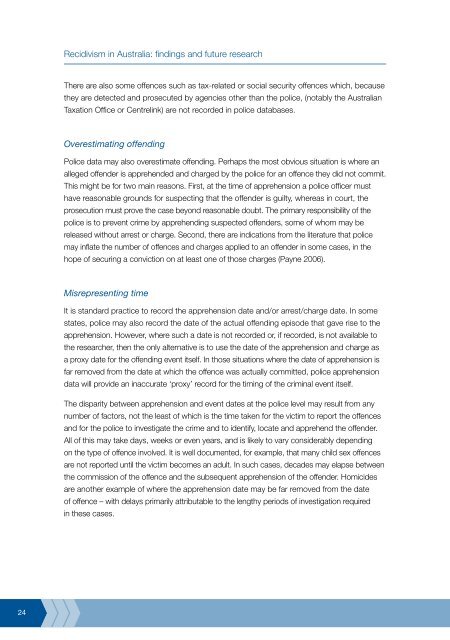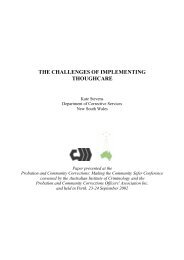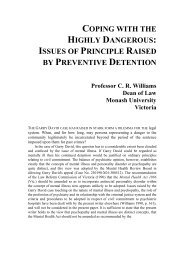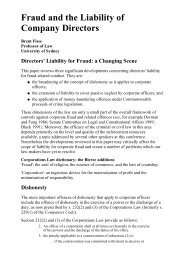Recidivism in Australia : findings and future research - Australian ...
Recidivism in Australia : findings and future research - Australian ...
Recidivism in Australia : findings and future research - Australian ...
You also want an ePaper? Increase the reach of your titles
YUMPU automatically turns print PDFs into web optimized ePapers that Google loves.
24<br />
<strong>Recidivism</strong> <strong>in</strong> <strong>Australia</strong>: f<strong>in</strong>d<strong>in</strong>gs <strong>and</strong> <strong>future</strong> <strong>research</strong><br />
There are also some offences such as tax-related or social security offences which, because<br />
they are detected <strong>and</strong> prosecuted by agencies other than the police, (notably the <strong>Australia</strong>n<br />
Taxation Office or Centrel<strong>in</strong>k) are not recorded <strong>in</strong> police databases.<br />
Overestimat<strong>in</strong>g offend<strong>in</strong>g<br />
Police data may also overestimate offend<strong>in</strong>g. Perhaps the most obvious situation is where an<br />
alleged offender is apprehended <strong>and</strong> charged by the police for an offence they did not commit.<br />
This might be for two ma<strong>in</strong> reasons. First, at the time of apprehension a police officer must<br />
have reasonable grounds for suspect<strong>in</strong>g that the offender is guilty, whereas <strong>in</strong> court, the<br />
prosecution must prove the case beyond reasonable doubt. The primary responsibility of the<br />
police is to prevent crime by apprehend<strong>in</strong>g suspected offenders, some of whom may be<br />
released without arrest or charge. Second, there are <strong>in</strong>dications from the literature that police<br />
may <strong>in</strong>flate the number of offences <strong>and</strong> charges applied to an offender <strong>in</strong> some cases, <strong>in</strong> the<br />
hope of secur<strong>in</strong>g a conviction on at least one of those charges (Payne 2006).<br />
Misrepresent<strong>in</strong>g time<br />
It is st<strong>and</strong>ard practice to record the apprehension date <strong>and</strong>/or arrest/charge date. In some<br />
states, police may also record the date of the actual offend<strong>in</strong>g episode that gave rise to the<br />
apprehension. However, where such a date is not recorded or, if recorded, is not available to<br />
the <strong>research</strong>er, then the only alternative is to use the date of the apprehension <strong>and</strong> charge as<br />
a proxy date for the offend<strong>in</strong>g event itself. In those situations where the date of apprehension is<br />
far removed from the date at which the offence was actually committed, police apprehension<br />
data will provide an <strong>in</strong>accurate ‘proxy’ record for the tim<strong>in</strong>g of the crim<strong>in</strong>al event itself.<br />
The disparity between apprehension <strong>and</strong> event dates at the police level may result from any<br />
number of factors, not the least of which is the time taken for the victim to report the offences<br />
<strong>and</strong> for the police to <strong>in</strong>vestigate the crime <strong>and</strong> to identify, locate <strong>and</strong> apprehend the offender.<br />
All of this may take days, weeks or even years, <strong>and</strong> is likely to vary considerably depend<strong>in</strong>g<br />
on the type of offence <strong>in</strong>volved. It is well documented, for example, that many child sex offences<br />
are not reported until the victim becomes an adult. In such cases, decades may elapse between<br />
the commission of the offence <strong>and</strong> the subsequent apprehension of the offender. Homicides<br />
are another example of where the apprehension date may be far removed from the date<br />
of offence – with delays primarily attributable to the lengthy periods of <strong>in</strong>vestigation required<br />
<strong>in</strong> these cases.















